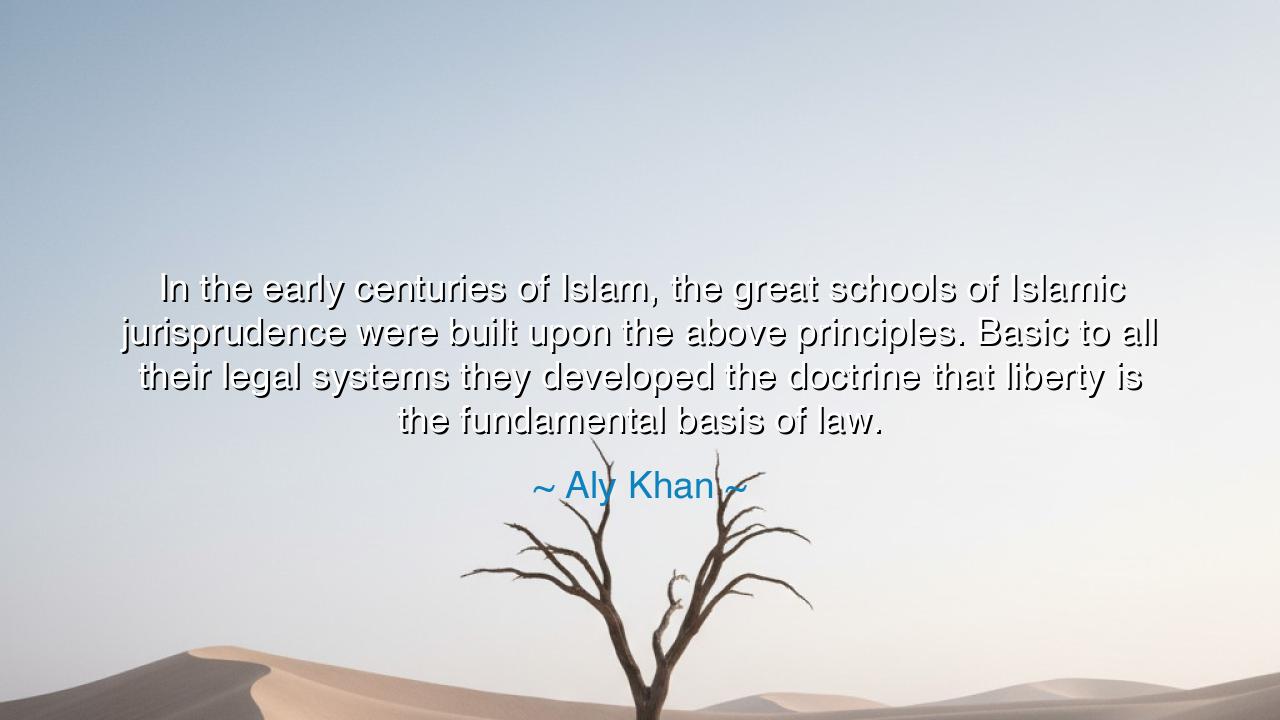
In the early centuries of Islam, the great schools of Islamic
In the early centuries of Islam, the great schools of Islamic jurisprudence were built upon the above principles. Basic to all their legal systems they developed the doctrine that liberty is the fundamental basis of law.






Hear, O children of wisdom, the noble words of Aly Khan: “In the early centuries of Islam, the great schools of Islamic jurisprudence were built upon the above principles. Basic to all their legal systems they developed the doctrine that liberty is the fundamental basis of law.” This is no light statement; it is a reminder that at the very heart of a civilization often portrayed only through its rituals and empires, there burned a radiant flame—the flame of liberty, enshrined not as privilege, but as the foundation of justice itself.
The early centuries of Islam were marked not only by conquests of land but by conquests of the mind. Great jurists such as Abu Hanifa, Malik ibn Anas, Al-Shafi‘i, and Ahmad ibn Hanbal did not merely craft rules to govern daily life; they sought to harmonize divine revelation with human dignity. At the root of their teaching lay the understanding that law exists not to enslave but to free, not to suffocate the spirit but to protect its breath. For in a world where rulers often sought dominion, the jurists raised their voices to declare: every soul is born free, and the law must preserve that freedom unless justice itself demands otherwise.
Consider the story of Caliph Umar ibn al-Khattab, who walked the streets of Medina unguarded, listening to the grievances of his people. When he heard of an Egyptian man whipped unjustly by the son of a governor, Umar summoned both oppressor and victim. He commanded the Egyptian to strike the governor’s son in return, saying, “Since when have you enslaved the people, when their mothers bore them free?” This, more than a tale of vengeance, was a proclamation of principle: that liberty is not the gift of rulers, but the birthright of every man and woman, guarded by the shield of law.
It is in this soil that the schools of Islamic jurisprudence grew—schools that debated fiercely, disagreed often, yet agreed upon one sacred truth: that coercion corrupts justice, while liberty strengthens it. Their doctrines were not dry scrolls but living streams, flowing into marketplaces, family disputes, and the courts of caliphs. By rooting law in liberty, they ensured that governance could not become mere tyranny dressed in robes of authority, but must instead bow before the dignity of the human soul.
We see echoes of this principle across civilizations. When the Magna Carta was sealed in England centuries later, it declared that even kings were bound by law, and that freedom could not be trampled by power. Yet long before that parchment, Muslim jurists had taught that divine law itself required liberty as its starting point. The convergence of East and West on this truth shows us that liberty, like sunlight, belongs not to one people but to all, and any law that seeks to endure must be nourished by it.
The lesson here is both ancient and urgent. For whenever laws are written without regard for liberty, they become shackles. But when liberty is enshrined, the law becomes a guardian, defending both the weak and the strong. In our own lives, we must remember this balance: the rules of society, the customs of our families, even the disciplines we set for ourselves—these must never strangle the spirit, but must instead be ordered toward freedom, justice, and dignity.
Practically, this means defending the rights of others as fiercely as we guard our own. It means questioning laws that oppress, resisting customs that enslave, and demanding leaders who recognize that they govern free people, not subjects. It means teaching our children that to live under law is not to live in chains, but to live in a garden where each person may flourish without fear.
Therefore, let Aly Khan’s words resound in our ears like the call of a herald: liberty is the fundamental basis of law. Remember it, guard it, and carry it forward. For where liberty is honored, law becomes a blessing; where it is forgotten, law becomes a curse. And the true mark of any civilization, ancient or modern, lies in whether it builds its house upon freedom—or upon fear.






AAdministratorAdministrator
Welcome, honored guests. Please leave a comment, we will respond soon